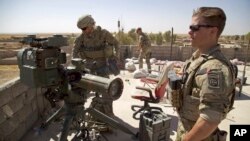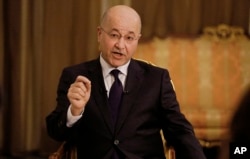Iraq's president said Friday he does not see any "serious" opposition when it comes to the presence of American forces in Iraq, provided they continue to be there specifically to assist Iraqi forces in the fight against the Islamic State group.
Barham Salih said there is "general consensus" that Iraq needs continued collaboration with the U.S. forces, which he said can go on "as long as it is necessary." He warned that the threat from IS is far from over, despite the announcement of the extremist group's territorial defeat in Syria last week.
Salih spoke to The Associated Press in an exclusive interview Friday in Baghdad, a day before traveling to Tunis to attend an annual Arab summit meeting.
Some 5,200 troops are stationed in Iraq as part of a security agreement with the Iraqi government to advise, assist and support the country's troops in the fight against Islamic State, which overran large parts of Iraq in 2014 after Iraqi forces collapsed, and proceeded to declare a self-styled caliphate over territory straddling Iraq and Syria. U.S. forces, which had left Iraq in 2011, were invited back to assist the fight against the group, and Iraq declared victory over IS in late 2017 after a ruinous and costly war.
Salih's comments are in stark contrast with that of mostly Iran-backed deputies in the Iraqi Parliament, who say they are preparing draft laws calling for a full withdrawal of U.S. troops, now that the war against IS is over.
"They are here for the specific mission of empowering and enabling Iraqi forces in the fight against ISIS. Nothing else. That is the specific exclusive mission, and in that context, I do not see serious opposition to the presence of these forces in Iraq today," Salih said, using an acronym for Islamic State.
He said he recently led a conversation among all the major political groupings of the country and there is "general consensus that that Iraq needs that collaboration." He said a debate or vote is not scheduled in Parliament at the moment.
Recent comments by President Donald Trump that he wanted U.S. troops to remain in Iraq to "watch Iran" provoked outrage in Baghdad, fueling the debate about the presence of U.S. troops in Iraq. Salih said any mission beyond what has been agreed to by the Iraqi government "is a subject that many political leaders of the country would take objection to."





